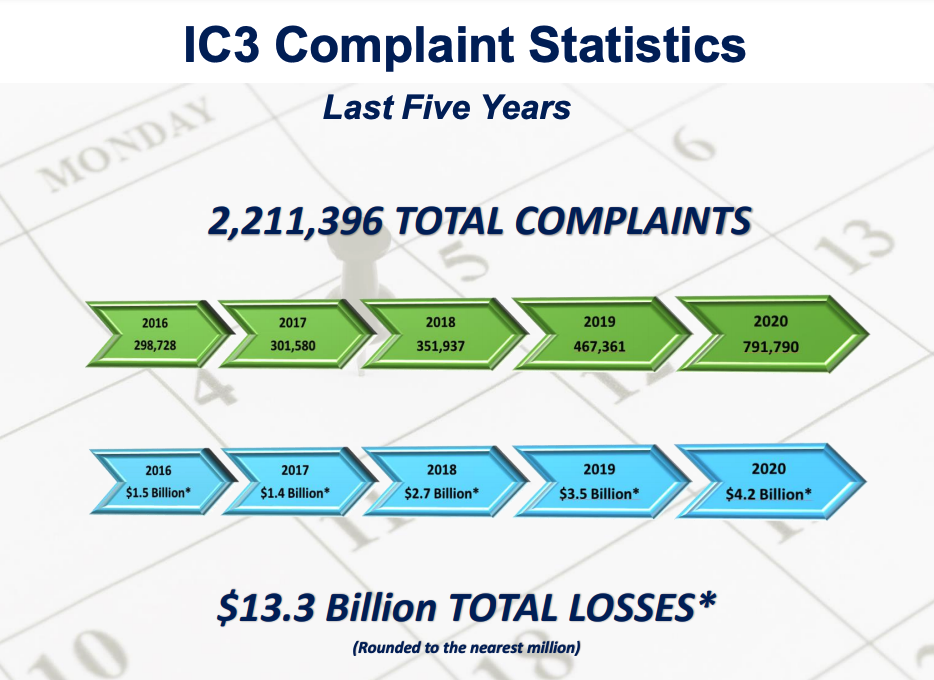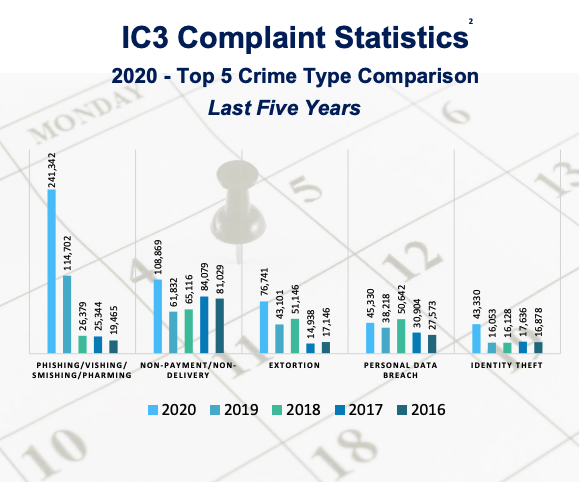The latest scams and cyber crimes you should be on the look out for this year.
We can all agree that 2020 was a challenging year, and in times of struggle, criminals seek to take advantage. The pandemic brought an unprecedented opportunity for cyber criminals as the whole world became more reliant on technology to keep their distance.
Spoofing, phishing, extortion, and other types of cybercrime all rose dramatically in 2020, as cyber-criminals targeted everyone from medical workers to individuals and families reliant on stimulus checks.
Below we summarize the most common scams and internet crime risks you should be looking out for this year.
Summary of 2020 Internet Crime Reported to IC3.gov
- 791,790 reported complaints of internet crime
- 69% increase in total complaints from 2019
- Total losses exceeding $4.1 billion
- Business E-mail Compromise (BEC) – 19,369 complaints totalling about $1.8 billion in losses
- Phishing – 241,342 complaints totalling about $54 million in losses
- Ransomware – 2,474 incidents reported in 2020
Coronavirus Related 2020 Internet Crime Risk
Last year, cyber criminals exploited opportunities created by the coronavirus pandemic to the full extent. Over 28,500 complaints were made to the IC3 in relation to COVID-19. Criminals targeted both businesses and individuals by scamming those eligible for Coronavirus aid and relief packages, such as the Economic Security Act (CARES Act). Reports show cyber crimes targeted coronavirus relief funds in all forms, such as stimulus funds, unemployment insurance, Paycheck Protection Program (PPP) loans, Small Business Economic Injury Disaster Loans, and more.
Tips for protecting yourself from scammers during the pandemic and beyond:
- Use extreme caution in online communication
- Check the name and email of the sender (sometimes just one letter could be changed to trick you into thinking it’s a business or person you know)
- Do not click on any unknown links or attachments
- Hover over any links to double check it is sending you to a safe and trusted website
- Question anything that sounds too good to be true
- Use extra caution with communication involving investment opportunities or medical advice
- Rely on trusted sources only for medical information, like your own doctor, or your local health department
- Practice extra caution during communication with financial institutions. Government impersonator schemes have been among the most prevalent scams
- Scammers can attempt to contact you by email, phone, and even through social media, so use caution for all forms of communication.
- Be wary of fraudulent ads on social media
- Make sure you check all the boxes on this cybersecurity checklist
- Bottom line: Do not give out your personal information to unknown sources
Business Email Compromise (BEC)
One of the most prevalent internet scams in 2020 was Business Email Compromise or BEC. BEC has become an increasingly sophisticated scam that can target both businesses and individuals through money transfers. Most commonly this scam is performed by compromising otherwise legitimate business email accounts. This is done by using social engineering or computer intrusion techniques to conduct unauthorized transfers of funds. In other words, the scammers create false email addresses that look trustworthy, or hack legitimate email addresses such as those of colleagues, vendors, or lawyers. Scammers then use these emails to trick the recipient into transferring funds. In 2020 the IC3 reported an increase in these scams involving cryptocurrency.
Tech Support Fraud
In 2020, the IC3 received 15,421 complaints related to Tech Support Fraud with a 171% increase in losses compared to 2019. Tech Support fraud involves a criminal who pretends to be a representative offering customer or technical support. These scenarios often involve a fake agent helping an individual with a compromised email or bank account, a computer virus, or software license renewal. It is becoming increasingly common for these criminals to be found posing as customer support for financial institutions, utility companies, or virtual currency exchanges. Victims report that they are asked to make wire transfers or purchase prepaid cards.
Tips for avoiding Tech Support Fraud:
- Remember legitimate customer service or tech support companies generally do not initiate contact with you
- Instal ad-blocking software
- Pay attention to where you get tech support contact information
- Do not give unknown people or businesses remote access to accounts or devices
- Ensure all your computer anti-virus, security and malware protection is up to date
Ransomware
Ransomware is a type of software or malware that steals data on a computer and encrypts it so that it becomes unusable. The criminal behind the ransomware attack will hold this data “hostage” and demand a ransom be paid in order to restore the data. These attacks are often coordinated through email phishing where a malicious file or link is sent to an email recipient. When the file or link is opened the malware will infect the computer. Generally, these phishing email scams are broad and fairly easy to spot and avoid, but increasingly targeted and sophisticated ransomware attacks are becoming a risk. In 2020, the IC3 received 2,474 ransomware complaints with adjusted losses totalling approximately $29.1 million. To avoid ransomware attacks, it is important that your security and malware protections are up to date and that you take caution in opening email links and attachments.
What is the IC3 and how do they help?
This post was written in summary of the IC3’s 2020 Internet Crime Report. The Internet Crime Complaint Center (IC3), is a trustworthy source for information on cyber criminal activity and a place where victims can file a report when they suspect a cyber crime has been committed. Reporting to the IC3 helps the FBI provide support for victims and prevent future attacks by finding and holding cyber criminals accountable. It is important for the public to report all instances of cyber crime in order to build a safer online environment for the future.
You can read the IC3’s full 2020 Internet Crime Report here.
If you would like to know if your business is protected from the most current cyber threats, contact us to schedule a free consultation and risk assessment.




